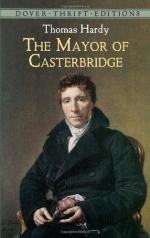The chief—almost the only—attraction of the young woman’s face was its mobility. When she looked down sideways to the girl she became pretty, and even handsome, particularly that in the action her features caught slantwise the rays of the strongly coloured sun, which made transparencies of her eyelids and nostrils and set fire on her lips. When she plodded on in the shade of the hedge, silently thinking, she had the hard, half-apathetic expression of one who deems anything possible at the hands of Time and Chance except, perhaps, fair play. The first phase was the work of Nature, the second probably of civilization.
That the man and woman were husband and wife, and the parents of the girl in arms there could be little doubt. No other than such relationship would have accounted for the atmosphere of stale familiarity which the trio carried along with them like a nimbus as they moved down the road.
The wife mostly kept her eyes fixed ahead, though with little interest—the scene for that matter being one that might have been matched at almost any spot in any county in England at this time of the year; a road neither straight nor crooked, neither level nor hilly, bordered by hedges, trees, and other vegetation, which had entered the blackened-green stage of colour that the doomed leaves pass through on their way to dingy, and yellow, and red. The grassy margin of the bank, and the nearest hedgerow boughs, were powdered by the dust that had been stirred over them by hasty vehicles, the same dust as it lay on the road deadening their footfalls like a carpet; and this, with the aforesaid total absence of conversation, allowed every extraneous sound to be heard.
For a long time there was none, beyond the voice of a weak bird singing a trite old evening song that might doubtless have been heard on the hill at the same hour, and with the self-same trills, quavers, and breves, at any sunset of that season for centuries untold. But as they approached the village sundry distant shouts and rattles reached their ears from some elevated spot in that direction, as yet screened from view by foliage. When the outlying houses of Weydon-Priors could just be described, the family group was met by a turnip-hoer with his hoe on his shoulder, and his dinner-bag suspended from it. The reader promptly glanced up.
“Any trade doing here?” he asked phlegmatically, designating the village in his van by a wave of the broadsheet. And thinking the labourer did not understand him, he added, “Anything in the hay-trussing line?”
The turnip-hoer had already begun shaking his head. “Why, save the man, what wisdom’s in him that ’a should come to Weydon for a job of that sort this time o’ year?”
“Then is there any house to let—a little small new cottage just a builded, or such like?” asked the other.
The pessimist still maintained a negative. “Pulling down is more the nater of Weydon. There were five houses cleared away last year, and three this; and the volk nowhere to go—no, not so much as a thatched hurdle; that’s the way o’ Weydon-Priors.”




